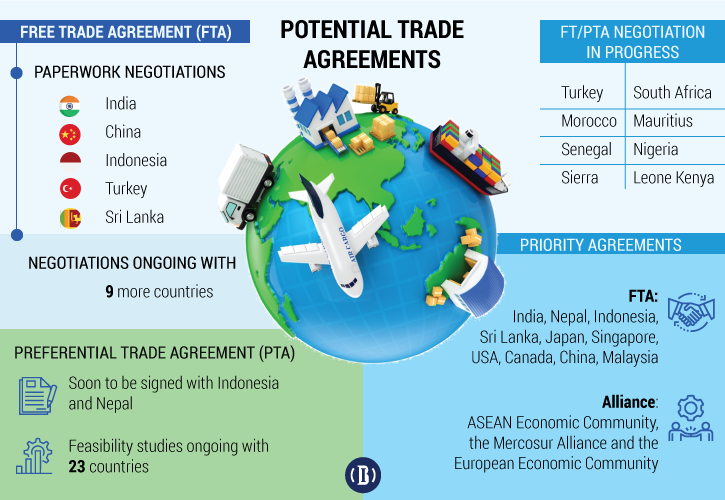Bangladesh negotiating FTAs, PTAs with 5 countries
Asif Showkat Kallol || BusinessInsider

Graphics: Business Insider Bangladesh
As Bangladesh transits from its least developing status into a developing one, its export sectors would be hit hard because importing nations will charge higher duties and home products will lose competitiveness in the international market.
To overcome this challenge, the government is hurrying to ink the Free Trade Agreement (FTA) with as many countries as possible, but currently paperwork and negotiations with five nations, including India are underway, a commerce ministry official said.
Other countries are China, Indonesia, Turkey and Sri Lanka.
Also, FTA negotiations are going on with nine more countries. However, the Preferential Trade Agreement (PTA) agreement with Indonesia and Nepal is going to be signed soon, the official added.
Besides, feasibility studies have been completed with 23 countries over accomplishing bilateral and regional preferential trade and integrated economic partnership agreements.
The Ministry of Commerce has highlighted this information in a progress report after being instructed by the Prime Minister. Both commerce and finance ministries are aware of the developments.
In 2014, Prime Minister Sheikh Hasina visited the Ministry of Commerce and gave 8 instructions, including taking initiatives to control commodity prices, increasing the capacity of TCB and making the Bangladesh Trade and Tariff Commission more dynamic. Besides, increasing exports, district-wise research on the prospects of non-traditional products and increasing production of tea, etc.
Further instructions were given to increase the coordination of diplomatic missions with the private sector, to establish a commercial unit in every diplomatic mission of Bangladesh abroad.
According to the report of the ministry, except one, the remaining seven instructions of the Prime Minister have been implemented. It is known that Bangladesh will lose the duty and quota free benefits while shipping products to the host countries after economic graduation in 2026. Besides, Bangladesh also strip out-bound products of subsidies that are currently being provided.
Exporters will lose a lot of capabilities while competing with peers.
A sub-committee on ‘Internal Revenue Collection and Tariff Rationalisation’, formed to address LDC transition challenges, has also recommended execution of Free Trade Agreements (FTAs) or Preferential Trade Agreements (PTAs) with various countries to avoid these negative effects. The committee also said there is a need to devise ways to encourage exports through alternative means.
In the progress report of the ministry, it is said that priority steps have been taken regarding the FTA with 10 countries and 3 alliances to increase export income. The countries are - India, Nepal, Indonesia, Sri Lanka, Japan, Singapore, USA, Canada, China, Malaysia. And, alliances include the ASEAN Economic Community, the Mercosur Alliance and the European Economic Community.
Besides, negotiations are progressing over signing of FTAs and PTAs with Turkey, South Africa, Morocco, Mauritius, Senegal, Nigeria, Sierra Leone, Kenya. According to a senior official of the ministry involved in this process, the export income of the country will increase further if the said agreements are completed. It will be possible to overcome the threat of a crisis in the export sector after transition from LDC status.
It is known that Bangladesh’s trade with Asia-Pacific countries is about $36 billion and about 50 percent of Bangladesh’s total imports come from countries of this region.
Experts believe that Bangladesh’s geographical location in the Asia-Pacific region enjoys some strategies. However, in the absence of Preferential Trade Agreements (PTAs) and Free Trade Agreements (FTAs), the existing potential for trade and commerce could not be utilised. According to them, Bangladesh’s participation in regional trade should be increased. For this, reforms in trade and investment policies and formulation of supportive policies, diversification of products, modernization of tax and customs structure, development of infrastructure sectors, expansion of cross border trade and use of information technology should be enhanced.
The issue of strengthening the Trade and Tariff Commission has not been fully implemented following the directives of the Prime Minister. In this regard, it is said that the Bangladesh Tariff Commission (Amendment) Act was passed in 2019 in the National Parliament. Presently, the work of making a new organogram is going on by updating the existing one.
























